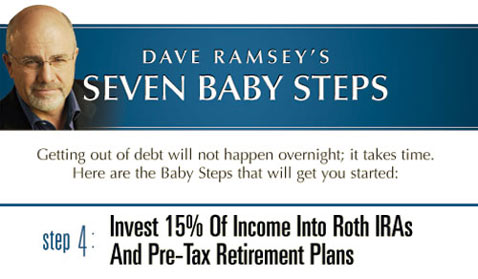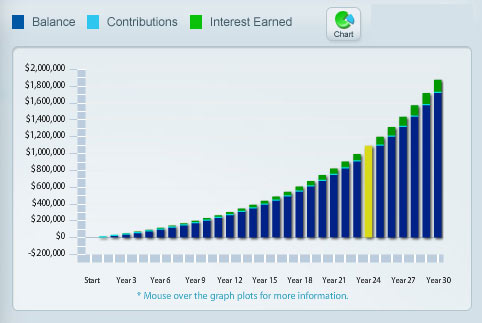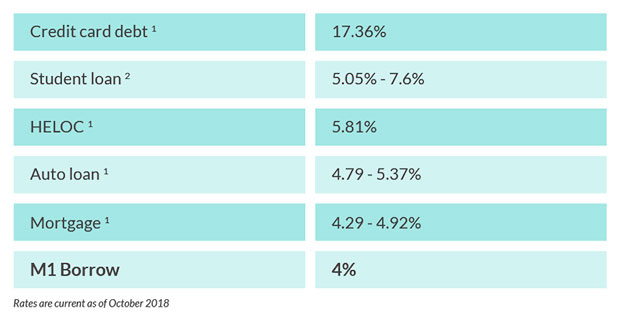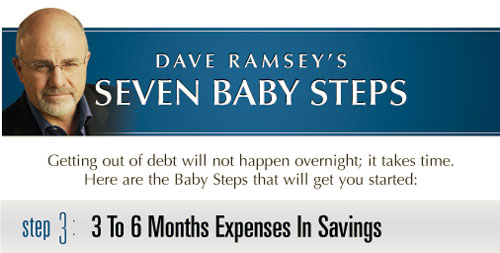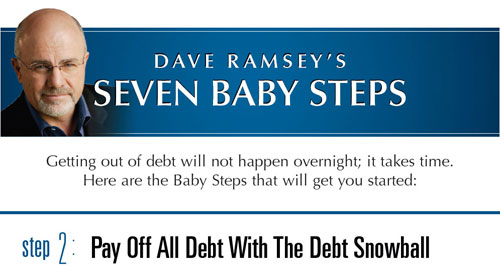In baby steps 1-4 we worked towards paying off debt, building up an emergency fund and investing 15-20% of our income. In baby step 5 we look at saving for your children's education.
Baby Step 5: College Funding For Children
Baby step 5 talks about how if you've taken care of your other priorities first (like saving for your own retirement), you can save up and help pay for your child's education.
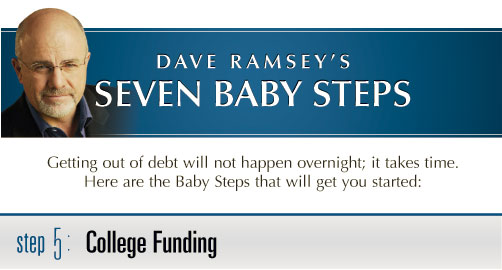
One thing that Dave Ramsey stresses, however is that you don’t have to go into debt for your child to go to college. Once you've taken care of your baby steps 1-4, start saving up a nest egg to help them pay for their education. Beyond saving for their education, also encourage them to take an active part in their own education, get good grades, and help pay for their education through grants, scholarships and other free money. If they're involved in paying for their own education, they'll be more invested in it.

Here are some ways that you can save for your kid's college education.
- Education Savings Account (ESA): You may save $2,000 (after tax) per year, per child that grows tax free! Beneficiary must be under 18 years old. Money must be used for education purposes only. Otherwise, a 10% penalty and taxes will apply. Money must be used or rolled over to a qualifying family member by age 30 or a 10% penalty and taxes will apply. Singles with an income over $110,000 – or married couples with an income over $220,000 are not eligible.
- 529 Plan: If you do not meet the income limits for an ESA, or if you want to save money above an ESA, you can use a certain kind of 529 plan. You can save up to $12,000 per year, per child in a 529 plan. The money must be used for higher education only. Otherwise, a 10% penalty and taxes will apply to the gains only.
- UTMA/UGMA Plans: UTMA (or UGMA) stands for Uniform Transfer (Gift) to Minors Act. Not usually as good as the ESA or 529 plans.
Here are some ways that Dave Ramsey thinks should never be used to fund your child’s education. Beware of these things:
- Insurance
- Savings bonds (only 5-6% growth)
- Zero-coupon bonds. (only 6-8% growth)
- Pre-paid college tuition (only 7% inflation rate)
- 401k loan (never!)
- Home equity loan
ESAs, 529 Plans and UTMA/UGMA plans are preferred by Ramsey.
Should Other Things Come Before Your Kid's College Funding?
Providing for your child's education is an emotional topic, and for many people providing for their kid's and their schooling is so important it comes before they have reached baby step 5 in the process. They think that by not funding their child’s education until they have all their debt paid off or retirement funded that somehow they are being self absorbed or that they're harming their child.
In my opinion you do more harm if you don't do baby steps 1-4 first. Your kids can always help pay for their own education through grants, scholarships and loans. On the other hand, if you don't get money saved for retirement, and get all your other financial ducks in a row, your child could end up having to support you or pay for your care in the future. You don't want to saddle them with that responsibility do you? Better to get your financial house in order first, and then help where you can. If you can get out of debt, save for retirement and then help pay for their schooling as well – even better!
Here's why I believe it's a good idea to get out of debt and save for retirement first.
- Making sure your retirement is provided for takes a burden off of your children later on.
- Set a good example for your children by showing them how to properly manage your finances.
- Having to pay for part of your education helps build character and makes the education mean more.
- Encouraging them to do well ins school to help pay for their own university training will help promote responsibility.
Personally I think that even if you are able to pay for your child’s schooling outright, it’s a good idea to have them participate in paying for their own schooling. They can do that either by saving up for college through after school jobs, getting good grades that lead to grants and scholarships, and by going to in-state schools that cost less. Here's a post on another site talking about these ideas.
Dave Barry says it better than I can:
I believe that we parents must encourage our children to become educated so they can get into a good college that we cannot afford. – Dave Barry
In baby step 5 Dave Ramsey encourages us to take control of our financial lives, and take care of our own debts and retirement savings before helping our children to pay for college. Once we've completed steps 1-4, however, he suggests it's a good idea to help them pay for college by saving money in an ESA, 529 savings plan or a UTMA/UGMA Plan.
What’s your opinion of paying for your kid’s college? Are you saving for their college funds? Will they have to pay for part of it themselves? Let us know in the comments.
